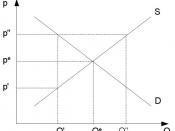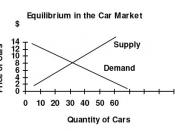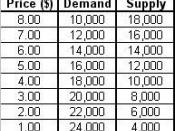The Effects of Rent Control Policies and
Standard Supply-and-Demand Theory
On the surface, rent control appears to be a very feasible solution to assist people in finding housing during hard times. It sounds simple; instate laws to ensure that rent does not exceed a particular value, and housing is kept affordable. However, the economic consequences of such a policy can be far-reaching and severe. William Ticker's Policy Analysis, How Rent Control Drives Out Affordable Housing argues and presents evidence to show that rent control policies instituted by government create economic shortages, shadow markets, hoarding, and low vacancy.
What is a shadow Market, and why does one
Develop when there is rent control?
The concept of a shadow market is used in the analysis of rent control. It is impossible for the government to regulate and control all commodities, which leads to a shortage. A shortage is a gap between supply and demand, where demand is greater then supply.
During this period other markets start to appear. Among those to appear there is a shadow market, which is an unregulated sector of a city. Governments usually tolerate shadow markets because they serve as a safety to the economy. "Using standard supply-and-demand theory, they predicted that prices in the unregulated portion of the market will be forced higher than their normal market value."(4) This is because the shadow markets have to fill the shortage, of the regulated sector. With the price of the regulated sector so low the unregulated sector carries the burden of the prices exceeding the market value.
Figure A: Standard Supply-and-Demand
Why is housing a particularly easy good to hoard?
How does this affect newcomers to a city?
Hoarding occurs when future supplies are unclear and consumers begin to act in the present. This depends though on the...


